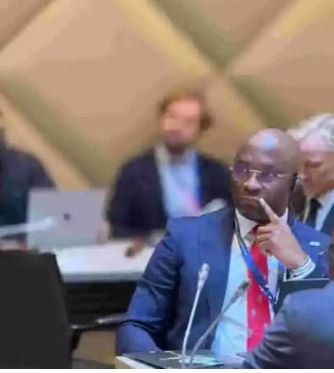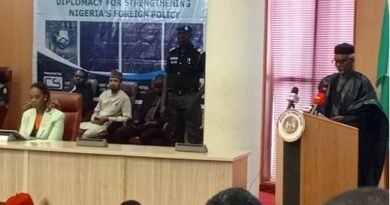Deputy Speaker Harps On Digital Trade Across Africa.
By Ferdinand Olise
The Deputy Speaker of Nigeria’s House of Representatives, Benjamin Kalu, has emphasised the critical role of Parliament in promoting multi-lateralism through digital trade.
The Deputy Speaker stated this in Geneva, Switzerland, while speaking on the theme “Promoting Multi-lateralism Through Digital Trade: What Role for Parliaments?” at the World Trade Organization/Inter-Parliamentary Union, (WTO-IPU), Steering Committee session of the WTO Public Forum 2025.

According to a statement from the office of the Deputy Speaker on Thursday, the Speaker stated this on the sidelines of the ongoing 55th Parliamentary Conference, said that digital trade is a defining governance challenge of the present time that shapes the daily reality of entrepreneurs and the future opportunities for youth.
He noted that Africa is proactively building its own regional multi-lateralism through the African Continental Free Trade Area, (AfCFTA), and its Protocol on Digital Trade, aiming for a harmonized and integrated digital market.
Citing Nigeria’s legislative actions, including the Nigeria Data Protection Act of 2023 and the forthcoming National Digital Economy Bill, the Deputy Speaker stressed that Parliaments across Africa are also actively legislating the future of digital trade.
He said: “The digital economy is no longer a distant promise; it is the daily reality of oour entrepreneurs and the horizon of opportunity for our youth. In Africa, we have chosen not to wait for others to write our future.
“Through the African Continental Free Trade Area (AfCFTA) and its Protocol on Digital Trade, we are building our own regional multilateralism, a blueprint for a harmonized, integrated digital market.
“But blueprints alone do not build houses. Success depends on the laws we pass, the trust we create, and the predictability we guarantee. In Nigeria,
we have acted: the Nigeria Data Protection Act of 2023 safeguards privacy, while the forthcoming National Digital Economy Bill will anchor e-commerce, and investment in legal certainty.
“Across Africa, parliaments are not spectators; we are legislating the future. Let us be frank, rules without enforcement are illusions. For smaller economies, a binding, two-tier dispute settlement system is not optional; it is survival.”
He further highlighted the importance of enforcement in making rules effective proposed three steps for coordinated action. These steps included legislative tracking mechanism, concrete WTO support for AfCFTA implementation to deepen digital trade in Africa, and a model digital trade legislative toolkit developed with UNCTAD and ITC to equip Parliaments with best-practice laws for a pro-development digital economy.
Kalu therefore called for a collective action among Parliamentarians, stressing that a digital trade can become a bridge linking trust, opportunity, and inclusive essential rather than a new divide.
“We all know that speeches do not build futures; actions do. For us to move to coordinated action, I propose three steps: a Legislative Tracking Mechanism that engenders peer‑to‑peer accountability, requiring us to report back on how we translate our collective resolutions into concrete action within our national parliaments; Concrete WTO support for AfCFTA implementation to further deepen digital trade in Africa; and a Model Digital Trade Legislative Toolkit developed with UNCTAD and ITC, to equip parliaments with best-practice laws for a pro-development digital economy.
“Colleagues, the choice before us is stark: a fragmented digital future shaped by others, or a shared digital prosperity shaped by us. If we act together, we can ensure that digital trade becomes not a new divide, but a new bridge, linking trust, opportunity, and inclusive multi-lateralism”, he added.




